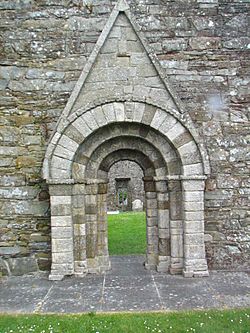Killeshin Church facts for kids
| Glenn Uisin | |
 |
|
| Monastery information | |
|---|---|
| Other names | Killushin, Glenn Ussen, Glenn Uissen, Glenn Uisen |
| Order | Celtic Christianity |
| Established | AD 545 |
| Diocese | Leighlin |
| People | |
| Founder(s) | Saint Diarmait mac Siabairr |
| Important associated figures | Saint Comgán |
| Architecture | |
| Status | Inactive |
| Heritage designation | National Monument |
| Style | Irish monastic, Romanesque |
| Site | |
| Location | Killeshin, County Laois |
| Coordinates | 52°50′51″N 7°00′05″W / 52.84738°N 7.00151°W |
| Visible remains | Part of church (west and east gables; part of north elevation) |
| Public access | yes |
| Official name | Killeshin |
| Reference no. | 115 |
Killeshin Church is an old church from the 1100s in County Laois, Ireland. It's built in a special style called Romanesque. Today, it's a very important historical site, known as a National Monument.
Contents
Where is Killeshin Church?
Killeshin Church is found close to Killeshin village in Ireland. It sits on the south side of the Fushoge River. This river flows into the larger Barrow. The church is about 5 kilometers (3 miles) west of Carlow town. You can also see an old circular fort, called Killeshin moat, nearby.
A Look Back: History of Killeshin
How the Monastery Started
A long time ago, around the year 545 AD, a monastery was built here. It was started by Diarmait mac Siabairr. He was part of the local Uí Bairrche ruling family.
Challenges and Changes
Over the years, the monastery faced some tough times. In 1041, it was attacked by Diarmait mac Máel na mBó. During this event, the wooden prayer house was destroyed. Many people were taken away, and cattle were seized. This attack was a response to earlier conflicts between different groups. The monastery was also burned again in 1077.
Sadly, none of the original monastery buildings are still standing today. There used to be a tall, round tower here. But it was taken down by the landowner in 1704.
What the Church Looks Like
The 12th-Century Church
The church you see today was built in the 1100s, probably between 1150 and 1160. It's made from rough stones with carefully shaped corner blocks. The church is famous for its beautiful Romanesque archway.
Special Carvings and Features
You can see amazing carvings on the church. Some of these carvings show animal shapes, which is called zoomorphic. There are also designs with complicated knotwork, which were popular in Scandinavia. Inside, there is a special stone basin called a granite font.
Near the door, there's an old message carved into the stone. It says "ORAIT DO DIARMAIT RI LAGEN." This means "a prayer for Diarmait, king of Leinster." This message is for Diarmait Mac Murchada, who was king from 1126 to 1171.
 | Delilah Pierce |
 | Gordon Parks |
 | Augusta Savage |
 | Charles Ethan Porter |


